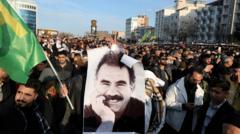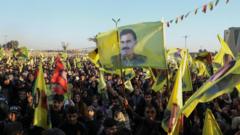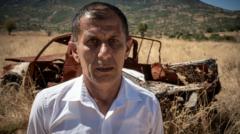After four decades of conflict and over 40,000 deaths, the PKK's disbandment marks a significant shift in Kurdish-Turkish relations in search of peace and political dialogue.
Kurdish PKK Announces Disbandment After 40 Years of Insurgency

Kurdish PKK Announces Disbandment After 40 Years of Insurgency
Kurdish militant group PKK declares it will lay down arms and dissolve in pursuit of greater autonomy
The outlawed Kurdish group PKK, known for its 40-year insurgency against the Turkish state, has officially announced its decision to lay down arms and dissolve. This development comes after a poignant plea from the group's imprisoned leader, Abdullah Ocalan, urging the PKK to disband in a letter released earlier this year. The PKK, which is designated as a terrorist organization by Turkey, the European Union, the UK, and the US, originally sought to establish an independent Kurdish state, but has shifted its goals towards seeking autonomy and rights for the Kurdish population, which makes up about 20% of Turkey's demographic.
Ocalan, who has been imprisoned since 1999 on an island in the Sea of Marmara, emphasized in his February letter the importance of a democratic approach to political resolutions, advocating for a solution through "democratic consensus." While the specific arrangements related to the PKK's disbandment remain ambiguous, there is speculation that Ocalan could be granted parole, sparking hopes among Kurdish politicians for renewed political dialogue and increased rights.
In light of recent Turkish military actions against PKK forces and changing geopolitical dynamics, both sides appear to have compelling motives for this agreement. President Erdogan’s increasing reliance on pro-Kurdish political factions for support ahead of the 2028 elections further underscores the urgency of rebuilding relations with the Kurdish community.
The announcement of the PKK's disbandment has been articulated as a vital move towards achieving a "terror-free Turkey." A spokesperson for Erdogan's ruling AK Party noted that the disbandment process would be closely monitored by state institutions. Experts like Winthrop Rodgers from Chatham House reflect on the situation, indicating that while Turkish leadership has displayed some goodwill, substantial political changes are still required to ensure true inclusion of Kurdish voices in Turkey's political landscape. "In many respects, the initiative now rests with Turkey," he concluded, emphasizing the time for significant democratic reforms.
Ocalan, who has been imprisoned since 1999 on an island in the Sea of Marmara, emphasized in his February letter the importance of a democratic approach to political resolutions, advocating for a solution through "democratic consensus." While the specific arrangements related to the PKK's disbandment remain ambiguous, there is speculation that Ocalan could be granted parole, sparking hopes among Kurdish politicians for renewed political dialogue and increased rights.
In light of recent Turkish military actions against PKK forces and changing geopolitical dynamics, both sides appear to have compelling motives for this agreement. President Erdogan’s increasing reliance on pro-Kurdish political factions for support ahead of the 2028 elections further underscores the urgency of rebuilding relations with the Kurdish community.
The announcement of the PKK's disbandment has been articulated as a vital move towards achieving a "terror-free Turkey." A spokesperson for Erdogan's ruling AK Party noted that the disbandment process would be closely monitored by state institutions. Experts like Winthrop Rodgers from Chatham House reflect on the situation, indicating that while Turkish leadership has displayed some goodwill, substantial political changes are still required to ensure true inclusion of Kurdish voices in Turkey's political landscape. "In many respects, the initiative now rests with Turkey," he concluded, emphasizing the time for significant democratic reforms.


















